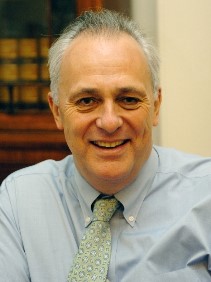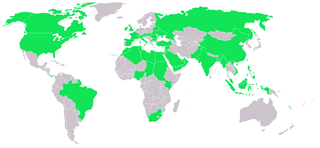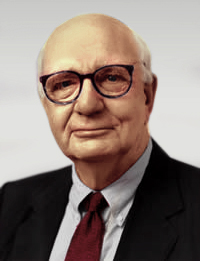
Kofi Atta Annan was a Ghanaian diplomat who served as the seventh secretary-general of the United Nations from 1997 to 2006. Annan and the UN were the co-recipients of the 2001 Nobel Peace Prize. He was the founder and chairman of the Kofi Annan Foundation, as well as chairman of The Elders, an international organisation founded by Nelson Mandela.

The United Nations (UN) is a diplomatic and political international organization with the intended purpose of maintaining international peace and security, developing friendly relations among nations, achieving international cooperation, and serving as a center for coordinating the actions of member nations. It is widely recognised as the world's largest international organization. The UN is headquartered in New York City, in international territory with certain privileges extraterritorial to the United States, and the UN has other offices in Geneva, Nairobi, Vienna, and The Hague, where the International Court of Justice is headquartered at the Peace Palace.

The Oil-for-Food Programme (OIP) was established by the United Nations in 1995 to allow Iraq to sell oil on the world market in exchange for food, medicine, and other humanitarian needs for ordinary Iraqi citizens without allowing Iraq to boost its military capabilities.

The United Nations System consists of the United Nations' six principal bodies, the Specialized Agencies and related organizations. The UN System includes subsidiary bodies such as the separately administered funds and programmes, research and training institutes, and other subsidiary entities. Some of these organizations predate the founding of the United Nations in 1945 and were inherited after the dissolution of the League of Nations.

Paul Adolph Volcker Jr. was an American economist who served as the 12th chairman of the Federal Reserve from 1979 to 1987. During his tenure as chairman, Volcker was widely credited with having ended the high levels of inflation seen in the United States throughout the 1970s and early 1980s, with measures known as the Volcker shock. He previously served as the president of the Federal Reserve Bank of New York from 1975 to 1979.

Kunwar Natwar Singh, IFS was an Indian diplomat and politician who served as the Minister of External Affairs from May 2004 to December 2005. Having been suspended by the Congress in 2006, he joined the Bahujan Samaj Party (BSP) in 2008 but was removed from the party within four months.
Benon Vahe Sevan was the head of the United Nations' Oil-for-Food Programme, established in 1996 and charged with preventing Iraq's government from using the proceeds from oil exports for anything but food, medicine and other items to benefit the civilian population.
Dileep Nair is a Singaporean diplomat and bureaucrat, who was the United Nations Under-Secretary-General for Internal Oversight Services and head of the United Nations Office of Internal Oversight Services. In that capacity, he oversaw investigations of wrongdoings related to the United Nations in a range of countries including within the headquarters. The Oil-for-food scandal was initially investigated by Dileep Nair's office before turning it over to the investigating body headed by former United States Federal Reserve Chairman, Paul Volcker.

George Mark Malloch Brown, Baron Malloch-Brown is a British diplomat, communications consultant, journalist and former politician serving as president of Open Society Foundations since 2021, having previously served as Deputy Secretary-General of the United Nations under Kofi Annan from April to December 2006. A former member of the Labour Party, he served as Minister of State for Africa and the United Nations in the Brown government from 2007 to 2009.
The human rights record of North Korea is often considered to be the worst in the world and has been globally condemned, with the United Nations and groups such as Human Rights Watch having condemned it. Amnesty International considers North Korea to have no contemporary parallel with respect to violations of liberty.

Louise Fréchette is a Canadian diplomat and public servant who served for eight years as United Nations Deputy Secretary-General. She also served a three-year term at the Centre for International Governance Innovation, an international relations and policy think-tank in Waterloo, Ontario, working on a major research project on nuclear energy and the world's security.
On 6 August 1990, four days after the Iraqi invasion of Kuwait, the United Nations Security Council (UNSC) placed a comprehensive embargo on Iraq. The sanctions stayed largely in force until 22 May 2003, and persisted in part, including reparations to Kuwait. The original stated purposes of the sanctions were to compel Iraq to withdraw from Kuwait, to pay reparations, and to disclose and eliminate any weapons of mass destruction (WMD).
Oilgate is a South African political scandal in which the petrol company Imvume Holdings was accused of paying R11 millions of state money to the ruling African National Congress shortly before the 2004 General Election. The money had been received from the state oil company, PetroSA, as part of an advance payment for a quantity of oil condensate that had been procured from Glencore, an international company.
The Cole Inquiry, formally the Inquiry into certain Australian companies in relation to the UN Oil-For-Food Programme, was a Royal Commission established by the Australian government pursuant to the Royal Commissions Act 1902 to investigate "whether decisions, actions, conduct or payments by Australian companies mentioned in the Volcker Inquiry into the United Nations Oil-for-Food Programme breached any Federal, State or Territory law."
Anna Di Lellio is a sociologist, journalist and former United Nations consultant. She has written on a number of topics relating to the United Nations' presence in Kosovo and Iraq. She graduated with a Ph.D. in sociology from Columbia University and a Masters in Public Policy and International Affairs from New York University.
The Oil-for-Food Program Hearings were held by the U.S Senate Permanent Subcommittee on Investigations beginning in 2004 to investigate abuses of the United Nations (UN) Oil-for-Food Programme in which the economically sanctioned country of Iraq was intended to be able to sell limited amounts of oil in exchange for vital food and medicine for its population.
The AWB oil-for-wheat scandal refers to the payment of kickbacks to the regime of Iraqi president Saddam Hussein in contravention of the United Nations Oil-for-Food Humanitarian Programme. AWB Limited is a major grain marketing organisation based in Australia. For much of the 20th and early 21st century, it was an Australian Government entity operating a single desk regime over Australian wheat, meaning it had the sole ability to export Australian wheat, which it paid a single, fixed price for. In the mid-2000s, it was found to have been, through middlemen, paying kickbacks to the regime of Saddam Hussein, in exchange for lucrative wheat contracts. This was in direct contradiction of United Nations Sanctions, and of Australian law.

United Nations Security Council resolution 1538, adopted unanimously on 21 April 2004, after expressing concern about the administration and management of the Oil-for-Food Programme in Iraq, the council ordered an inquiry to investigate the matter.
Virendra Dayal is a retired Indian Administrative Service officer and United Nations civil servant who served as Chef de Cabinet to Secretary General of the United Nations for more than a decade. He has served as the director of the Department of Political and Peacebuilding Affairs of the United Nations and as the special envoy who probed the allegations levelled against a number of India politicians including Natwar Singh, a former Minister of External affairs, in the Paul Volcker Committee report of 2005. A former Indian Administrative Service officer and a Rhodes Scholar of 1956 Dayal sat on the National Human Rights Commission of India as a member for two terms from 1998 to 2006. The Government of India awarded him the third highest civilian honour of the Padma Bhushan, in 1992, for his contributions to society.

Sazhi Zayndinovna Umalatova is a Russian politician, known for her Soviet legitimist activism, who claims to be the Chairwoman of the "Permanent Presidium of the Congress of People's Deputies of the USSR" since 1992.










